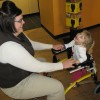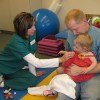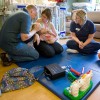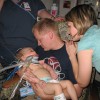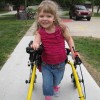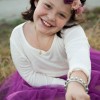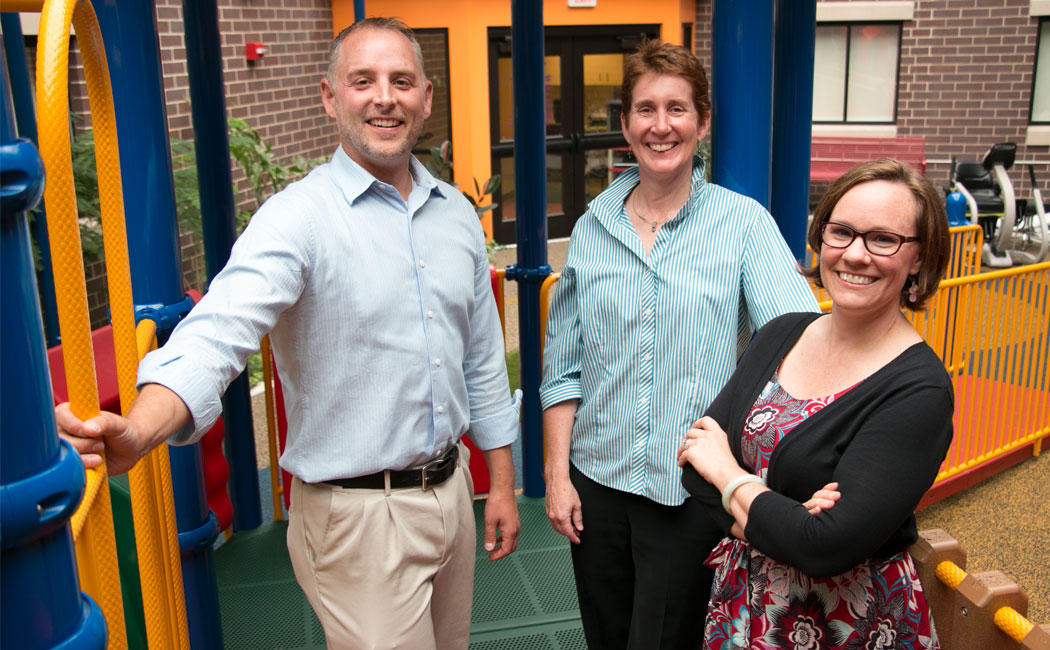
When Alexis Verzal first arrived at Madonna Rehabilitation Hospital in Lincoln, Neb., her future held many more questions than answers. While her parents Tiffany and Brandon Verzal grappled with these unknowns, this much they knew: Their world had been turned upside down.
To help families like the Verzals, researchers from UNL’s College of Education and Human Sciences are embarking on a project to reduce stress for primary caregivers whose children are recovering from a severe injury or illness.
Led by CYFS faculty affiliate Natalie Williams, the project provides massage therapy to caregivers during the first three weeks of their child’s inpatient rehabilitation at Madonna. That initial timeframe can be demanding and emotionally challenging for parents, who are adjusting to new family routines, responsibilities, and financial stressors.
Researchers aim to ease parents’ transition and improve family functioning—which may ultimately influence outcomes for recovering children.
“There are not many services focused on the parent to specifically help them adjust to this stressful environment,” said Williams, assistant professor of child, youth and family studies. “The child is embedded in the family; if the parent is struggling, then the child is struggling too.”
The project also aims to bridge a critical research gap within rehabilitation contexts, Williams said. Many existing approaches emphasize changes in parenting behaviors or practices, rather than reducing parents’ stress and promoting positive coping skills.
“(This research) should truly make a difference in the lives of future parents caring for children who have experienced a life-changing event.”
Tiffany Verzal
The project’s research team includes Judy Burnfield, director of Madonna Rehabilitation Hospital’s Institute for Rehabilitation and Engineering Sciences, and Paul Springer, associate professor of child, youth and family studies. To understand massage therapy’s effect on the mind, the team is assessing parents’ self-reported levels of anxiety and depression. To understand its effect on the body, they are measuring parents’ levels of salivary cortisol and alpha-amylase—biological indicators of the body’s response to stress.
The team is also collecting data from movement-tracking armbands, worn by participants for 72 hours, to track sleep quality. Parents will receive either one or three massages per week as researchers examine the impact of massage frequency on their psychological well-being and biological response.
While the current study supports adult caregivers, it may also guide future research aimed at helping other members of the family.
“This is essential, foundational work to pursue larger questions related to how we can better manage the stress that families experience during the recovery of a loved one, whether a child or adult,” Burnfield said. “There is a lot of stress after a person has had an injury; if we can reduce it, there is no doubt it will make a difference.”
Tiffany Verzal serves on the study’s advisory board and has experienced that stress firsthand—and its profound ripple effect. The Alexis Verzal Children’s Rehabilitation Hospital at Madonna is named after her daughter, Alexis.
When Alexis was 13 months old, she suffered a traumatic brain injury at a Texas daycare and was soon transferred to Madonna. Her injuries were consistent with shaken baby syndrome.
The Verzal family then made a difficult decision: Tiffany and her husband, Brandon, would quit their jobs in Texas, relocate to Nebraska and continue Alexis’ treatment at Madonna. Their journey, however, was just beginning.
“You’re going through a great deal, from hoping that your child survives to moving hospitals, changing doctors, managing insurance, continuing to balance your day-to-day life and then learning how to offer a new level of care to your child,” Tiffany Verzal said. “Oftentimes it is very hard to care for yourself, and your sole focus is on your child’s health.”
Yet as Tiffany and Brandon cared for Alexis, they began to notice changes in her response to each parent. When Brandon held Alexis, she relaxed. When Tiffany held her, she would cry and become agitated.
The difference between the two reactions, Tiffany said, was her outward stress and residual anger toward the family’s former daycare provider.
“As soon as I started working on my emotions, Alexis seemed to begin to act more calmly when I was around and began to make more progress when I was with her during rehab sessions,” Tiffany Verzal said. “I feel that reducing parents’ stress during the time of rehabilitation is a primary key to a child’s successful recovery.”
The Verzal family’s experience helped UNL researchers develop their study as they aimed to encourage self-care without placing additional demands on parents’ time. Massage therapy, with its existing empirical evidence for stress relief, was consistent with that goal, Williams said.
With the massage therapy study now underway at the Alexis Verzal Children’s Rehabilitation Hospital, the girl who inspired its name has moved on. After seven years of rehabilitation, Alexis graduated from outpatient recovery in May 2015 and is currently a third–grade student in Lincoln, Neb.
As that chapter closes for her daughter, Tiffany Verzal views the massage therapy study as the beginning of another—one that will elevate the importance of positive family care.
“I truly believe that by helping the entire family heal, we will continue to see more positive outcomes with children recovering from severe injury and illness,” Tiffany Verzal said. “(This research) should truly make a difference in the lives of future parents caring for children who have experienced a life-changing event.”
Video overview of Alexis’ rehabilitation
Photo Gallery (courtesy of the Verzal family):
The project is funded by the Massage Therapy Foundation and housed in CYFS.
